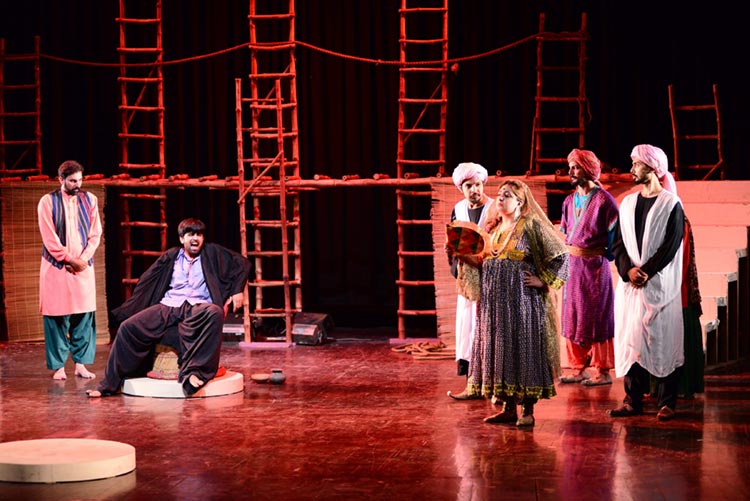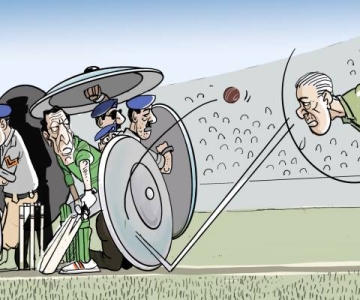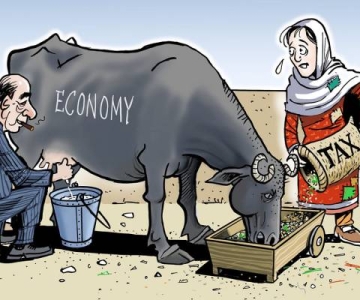

 Who is entitled to keep the child – one who is a better, nurturing mother, or the one who may be the natural mother but could not care for the child? The larger question then haunts the audience: who is entitled to ownership – the one who has the deed or the one who tills the land?
Who is entitled to keep the child – one who is a better, nurturing mother, or the one who may be the natural mother but could not care for the child? The larger question then haunts the audience: who is entitled to ownership – the one who has the deed or the one who tills the land?
Ajoka Theatre has revived a production that was first staged twenty three years ago. A deft adaptation of Bertolt Brecht’s The Caucasian Chalk Circle, its vernacular version, Chaak Chakkar, is a timeless comment on the viciousness of Pakistan’s exploitative culture of power politics. Perhaps the duo, Shahid Nadeem the playwright, and Madeeha Gauhar the director, would have tried to capture bits of social reality in the mid 1980s when General Zia was still the Lord Master of Pakistan. Why did Ajoka choose to stage this after a gap of two decades?
As Madeeha Gauhar explained: “In 2008 one marvels at how Brecht had foreseen the chaos, the anarchy, the shameless switching of loyalties of recent years, especially since the return of the popular leadership exile.” The seat of total power, “symbolized as Lal Mahal, is uncannily similar to Lal Masjid and Lal Haveli of our times,” she added.
Brecht (1898-1956) a German poet, playwright, and theatre director was a pioneer of socially relevant theatre. Brecht’s productions and the tours undertaken by the Berliner Ensemble – the post-war theatre company operated by Brecht and his wife and comrade, the actress Helene Weigel – left a profound impression on the global theatre scene. Throughout his eventful life, Brecht remained a committed Marxist who, in formulating and practicing the theory of “epic theatre,” explored theatre as a forum for political advocacy and the development of critical aesthetics concerning dialectical materialism.
The Caucasian Chalk Circle was written in 1944 and represents in many ways the essence of Brecht’s epic theatre movement. The play is an allegory about a village girl who steals a baby but turns out to be a better mother than its natural parents. The play is inspired by Brecht’s own short story. Both derive from the 14th-century Chinese play Circle of Chalk by Li Xingdao.
In Nadeem’s adaptation the locale changes and the presentation is indigenised with the use of local metaphors and musical traditions. For instance, the cruel Subedar is Akhar-zai (the Punjabi Akhar and the Pushtun Zai are merged here) and the central character has a quintessentially Punjabi name, Rano.
The scenes of rebellions and revolts and the inhumanity of looting armies were well-rendered with the help of musical scores. Rano protects the son of the Subedarni (the wife of a local landlord) who has to rush into exile. The Subedarni is more concerned with her “valuables” and forgets her little baby. Rano, engaged to a soldier, runs from pillar to post protecting the child and facing the social opprobrium of an unmarried single mother. At the end of the play when the trial for child custody takes place, the question of motherhood is strongly advanced: who is entitled to keep the child – one who is a better, nurturing mother or the one who may be the natural mother but could not care for the child. The larger question then haunts the audience: who is entitled to ownership – the one who has the deed or the one who tills the land. Thus the play strongly drives the message of social ownership and breaking free of the iniquitous cycle through its various stages.
The young actor Hania Cheema in the central role of Rano is a talent to reckon with. Her voice is well suited for theatre and her movements were almost flawless. Ajoka would do well to hone her potential in the coming years. However, it was Usman Zia in the dual roles of Hawaldar and Ajab Khan the judge, who outshone the cast through his fluid movement, sense of timing and a gift for comedy.
The only problem with the presentation of Chakar was its length: two hours were a bit too long. It would be essential to edit this duration in its future productions to sustain the interest and to overcome the hazard that the key messages of the play are not lost in the few avoidable twists and turns and its myriad sub-plots.
My companion at the play was Feryal Ali Gauhar who played Rano’s role in 1985. It was a charged occasion for Feryal and Ajoka: twenty three years later, the drama had a new cast and its message was still valid. Who said that the more the things change, the more they remain the same? Lahore Arts Council has done a brilliant job of giving space to alternative theatre though this presentation was sadly to be followed by a crass Punjabi comedy often centred on the steamy mujra numbers.
I cannot resist the temptation to recall that a few seats in the front row where Feryal and I sat were broken. And the carpets had stains reflecting the general level of indifference of authorities and lack of civic sense. It is time that Alhamra, the fulcrum of Lahore’s cultural scene, is maintained well and not made into another specimen of our collective neglect.
Published in The Friday Times (October 24 issue)



